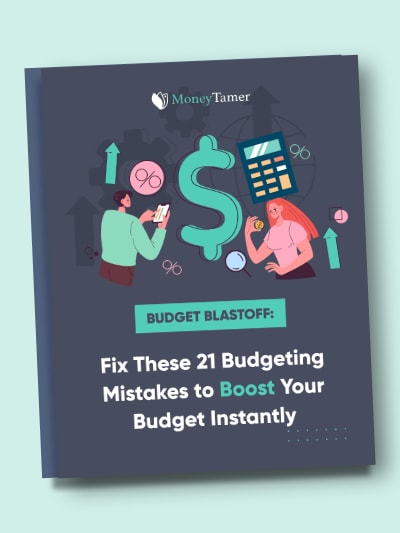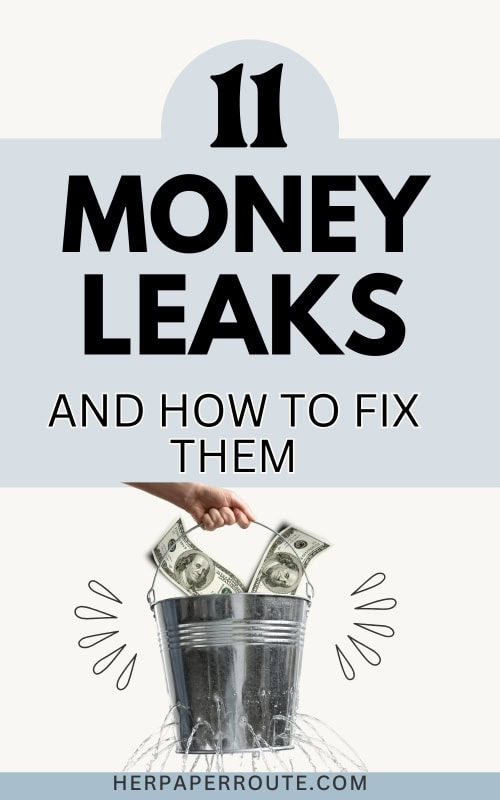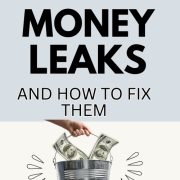11 Money Leaks, How To Stop Them Now

Everyone can afford to tighten up their spending in one way or another. Even if you maintain a strict budget, track your income and expenses, and make responsible purchases, you probably still have one or two money leaks that need to be plugged.
Money leaks are small expenses that add up over time. While you might not think much of the few dollars you spend every month on take-out or streaming services, these expenses can add up to hundreds or thousands of dollars per year.
As an affiliate partner of various brands and sponsored content, HerPaperRoute may earn commission on qualifying purchases. Disclaimer
By identifying your unnecessary expenses, you can start padding your savings and stop letting your dollars go to waste.
What is a Money Leak?
Money leaks are small expenses that add up over time.
This can include anything from buying take-out for lunch every day to paying for subscription services that you no longer use. A single money leak might not do too much damage on its own, but when combined, these nonessentials can add up quickly.
If you’ve ever looked at your bank account and wondered where all of your money went, chances are there are several small expenses that you’re overlooking.
By focusing on areas where you didn’t realize you were overspending, you can maximize the value of each dollar you earn and improve your overall financial health.
Money Leak #1: Paying Full Price for Name Brand Products
Name brands are attractive for several reasons. You may view them as more trustworthy than other brands. You might consider them to be more premium. Or, they might just be more familiar to you.
But name brand products aren’t always worth the price. For many types of products, particularly cosmetics, clothes, and prescription drugs, generic or off-brand products offer the same quality at a fraction of the price.
Cosmetics
Consumers are understandably careful when purchasing cosmetics. Low-quality products with harmful ingredients may cause negative side effects like allergic reactions, breakouts, and more.
If cosmetics are eating up your budget, take a look at the ingredients in your usual products and look for off-brand cosmetics that contain the same elements.
Depending on your current spending, this simple switch could easily save you hundreds of dollars every year.
Related: Tips for Spending Less Money on Makeup
Clothes
For many name brand clothing brands, the quality does not match the price. If your goal is to save as much money as possible, quality and longevity should be the priority when purchasing new clothes.
Opting for smaller known brands that produce high-quality, durable clothing means that you’ll spend less on clothes in the long-term, and you won’t have to sacrifice looks in the process.
Prescription Drugs
In recent years, the cost for a typical generic prescription drug used to treat chronic illness averaged $365, while name-brand alternatives averaged $6,798.
By opting for generic prescription drugs, which are typically the exact same as the name-brand versions, you could save thousands of dollars per year.
Money Leak #2: TV Services
TV is a great convenient source of entertainment, but it could be the reason you’re not saving as much money as you would hope.
Cable TV
Compared to streaming services, cable TV costs are pretty high — and they’re getting even higher. Major cable providers, like AT&T, Charter, and Comcast, hike up their prices every few years.
By switching to a streaming service or an online cable provider, you can save on your monthly cable bill without missing out on your favorite shows.
Too Many Streaming Services
Streaming services might be a way to save on cable, but only if you are selective with your subscriptions.
If you have active subscriptions for Netflix, Hulu, YouTube TV, Showtime, HBO Max, and Disney+, you could easily be spending much more than you would for basic cable.
Go through your active streaming subscriptions and cancel all of the ones you aren’t actively using. You can always renew your subscription briefly to watch a specific show and cancel it again once you’re finished.
Money Leak #3: Take Out or Drive Through Meals
Business Insider shared that US residents from ages 35 to 44 spent an average of $4,429 on take-out, while people ages 25 to 34, spent an average of $3,416.
To save on take-out costs, you should make an effort to plan meals and cook more often at home. Skip the take-out lunch breaks and reserve eating out for special occasions.
Money Leak #4: Convenience Store Purchases
Small purchases from convenience stores and gas stations can easily be eliminated and save you a significant amount of money in the long run.
Coffee Shops
$5 per day for your morning coffee might not seem like much, but over the course of just a month, that would add up to around $150.
If you find you are spending excessive amounts of money at coffee shops, make your own coffee at home in the morning.
Snacks at Gas Stations
Stopping at the gas station during your break or on the way home from work to grab a quick snack is a habit that many of us have.
While a couple of dollars here and there won’t make much of a difference, if you have a habit of doing this often, you may be wasting hundreds of dollars per year on unnecessary snacks and drinks.
Expensive Water
Water is free and plentiful. There’s no reason for most people to waste hundreds of dollars every year on overpriced bottled water.
Instead of purchasing wasteful plastic water bottles, opt for a high-quality reusable water bottle to save money and benefit the environment. If you’re averse to drinking tap water at home, purchase a cheap Brita filter to avoid buying expensive water.
Money Leak #5: Phone Plans
Phone plans are essential for most of us, but you could be paying for unnecessary fees and services that are draining your bank account.
Hidden Charges and Fees
There are several hidden fees to look out for on your phone bill, including:
- Excess data usage
- Paper bill fees
- Credit card fees
- Late payment fees
- Prepayment fees
Be sure to carefully review your bill and call your phone company if you find any charges that you’re not sure about.
Services You Don’t Use
Make sure you’re only paying for what you actually use.
For example, if you have a telephone and cable TV bundle, but you watch most of your TV through streaming services, change your plan to cut out the cost for cable.
Similarly, if you are paying extra for unlimited data but you only use 3 GB of data per month, then consider downgrading to a limited data plan.
Money Leak #6: Bank Fees
Watch out for these unnecessary bank fees and consider opening a new account without fees.
Monthly Fees
Banks may charge a variety of monthly fees that can add up over time. This might include minimum balance fees, maintenance fees, paper bill fees, and more.
Review your bank statement for monthly charges and consider opening a new account that omits these fees.
ATM Fees
Many banks will charge ATM fees if you don’t use their own branded ATMs.
Download your bank’s app to easily find fee-free ATMs near you, and consider opening an account that offers ATM fee reimbursement.
Overdraft Fees
Accidentally making too large of a purchase can lead to unnecessary overdraft fees.
To avoid this, carefully monitor your bank account balance to avoid overspending, and consider looking for an account that offers overdraft protection.
Money Leak #7: Subscriptions
Subscriptions can be cost-effective in certain cases, but if you’re carrying too many at once, your bank account is probably suffering.
Shave Clubs
Shave clubs have become very popular in recent years as they let consumers try a wide variety of high-quality products.
But if you’re trying to save money, purchasing shaving products and equipment separately and in bulk is a much more cost-effective solution.
Cosmetic Bags
Like shave clubs, cosmetic bag subscriptions let buyers try a wide range of products and are perfect for hobbyists and enthusiasts.
As much fun as they might be, though, they are a major money leak that can be easily avoided by sticking to a select few products.
Specialty Food Items
Snack boxes let people try new foods and introduce themselves to foods from different countries and cultures.
Unfortunately, like eating take out too often, specialty food boxes are an expensive and wholly unnecessary expense.
Internet Memberships for Things You Rarely Use
Internet memberships can be worthwhile. A LinkedIn subscription, for example, can help you build your professional network and get more career opportunities.
You should be careful, though, to avoid paying for services you rarely or never use. If that LinkedIn subscription isn’t generating value for you, you should cancel it as soon as possible.
Meal Subscriptions
HelloFresh, Blue Apron, and other meal delivery services are incredibly convenient as they provide the exact ingredients and recipes needed to make a great meal, but they can be exceedingly expensive.
Avoid this expense by carefully planning your grocery list and meal prepping in advance so you aren’t tempted to opt for this convenient money leak.
Money Leak #8: Gym Memberships
Gym memberships are a luxury, not a necessity. If you can afford the upfront cost for home gym equipment, you’ll save thousands of dollars in the long run.
If you aren’t able to afford home gym equipment, you can still likely reduce your monthly membership expense by switching from a luxury or specialty gym to an affordable alternative.
Money Leak #9: Unexpected Gift Buying Occasions
Purchasing gifts for others is often an unexpected obligation that can be a major financial burden.
Parties for Colleagues
If your workplace is holding a party for a colleague, like a birthday or retirement party, you may feel obligated to purchase a gift.
In these situations, consider talking to coworkers about purchasing a group gift. If this isn’t an option, stick to something small to avoid spending too much on gifts throughout the year.
Children’s Social Invitations
If you have children, you’ll likely find yourself at several parties and events throughout the year.
While gifts are often customary in these situations, don’t feel obligated to go all out. Opt for something reasonable and affordable to save money, or encourage your child to make a homemade gift for their friend.
Money Leak #10: Disposable Products
When you purchase, you’re literally throwing away money. Avoid these types of disposable products to save money.
Paper Products for Dining
Paper plates, plastic utensils, and paper cups can be convenient for specific circumstances, like parties or picnics, but are otherwise very wasteful.
Skip the paper plates and stick to affordable, high-quality dishware to avoid wasting money.
Disposable Cleaning Products
Disposable cleaning products like paper towels typically don’t last very long and are relatively expensive when you consider how frequently they need to be purchased.
Instead, consider using washable towels or reusable products made of bamboo and other natural materials.
Money Leak #11: Delivery Service Fees
Delivery apps have replaced going out to eat for many, but if you’re trying to save money, they aren’t worth the fees.
Take Out Food Delivery Services
GrubHub, Postmates, Uber EATS, and other delivery apps charge service fees and delivery fees that can quickly increase the cost of a meal. When you include tipping, a meal from one of these services can easily be almost double what it would cost if you got it yourself.

Are You Sabotaging Your Budget?
See the budgeting mistakes that are holding you back in this FREE Budgeting ebook. Fix these and your budget will blast off!
Grocery Delivery Services
Grocery delivery apps like Instacart are very convenient for busy professionals who have trouble finding time for grocery shopping, but by ordering groceries directly from the supermarket for in-person pickup, you can save time without incurring additional fees.
What causes leaking spending?
Leaking spending results from poor financial planning and impulse purchases that you may not consider expensive at the time, but over time, these purchases add up quickly.
Lack of Planning
Poor budgeting and financial planning makes it easy to fall victim to leaking spending. If you aren’t monitoring your spending and recurring expenses, you’re likely to overlook many areas in which you could be saving money.
Plan your budget in advance and cut out the unnecessary purchases that don’t fit within your budget.
Impulse Buys
Impulse purchases can combine to be worth hundreds or thousands of dollars throughout the course of a year.
If you feel the urge to make a purchase that you’re not sure is necessary, put it off for a week or a month. If after this time you still feel you need it, you can make the purchase knowing that it is a necessity and not an unnecessary impulse buy.
Related: 7 Steps to Stop Impulse Purchasing Immediately
How do you avoid spending leaks?
You can avoid spending leaks by implementing basic financial practices like budgeting, expense tracking, and financial planning.
Make a Budget
Your first step to avoiding money leaks is creating a sensible budget.
List out all of your necessary expenses, including rent, bills, food, savings, etc., and subtract them from your income. Create budgets for entertainment, take out, and other luxuries, and avoid going over these budgets even if you feel like you can afford it.
Track Your Receipts
Tracking your spending will help you identify money drains more easily and aid you in creating a more effective budget.
Review your receipts every month to find categories in which you overspent and factor this into your monthly budget.
Avoid Places That Cause You to Impulse Buy
If you find that a certain store or establishment encourages you to make unnecessary purchases, it might be time to stop going.
This could include clothing stores, bars, clubs, thrift stores, antique stores, or anywhere else that tempts you to spend excessively.
Plan for Discretionary Spending
Budgeting doesn’t mean that you shouldn’t ever spend money on nonessentials, but you should only be buying what you can truly afford without sacrificing necessities or savings.
The easiest way to avoid overspending on nonessentials is to include your unnecessary expenses in your monthly budget.
Conclusion: You Can Identify and Stop Money Leaks
Money leaks affect most of us and can be very financially draining, but they are avoidable.
By taking the time to review your spending, plan your budget, and optimize your spending habits, you can identify money leaks and put a stop to them before they do too much damage to your bank account.
Related Articles:

Follow along on Instagram!











